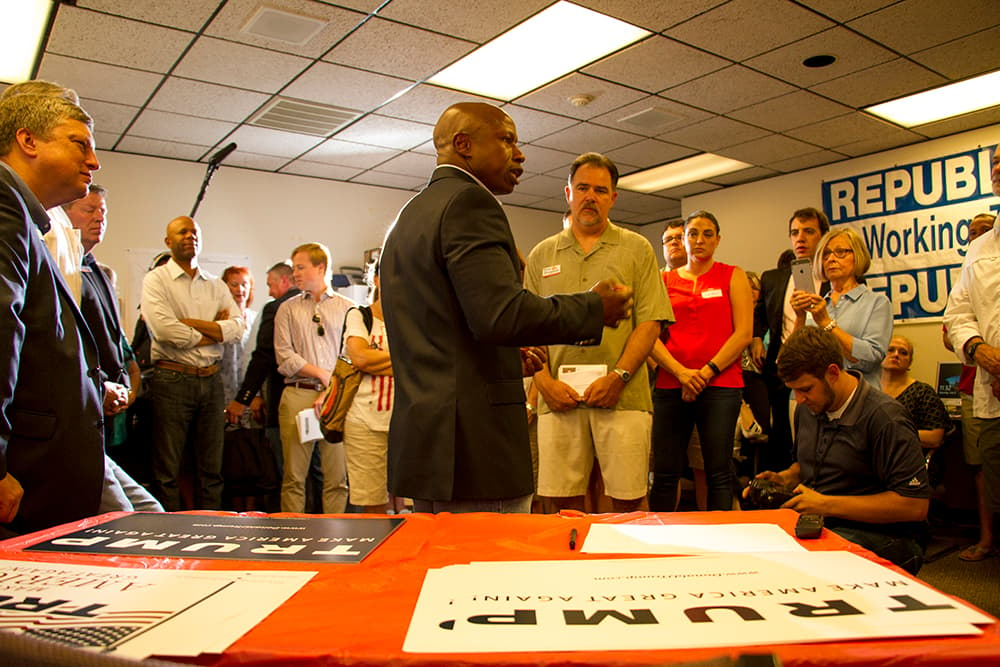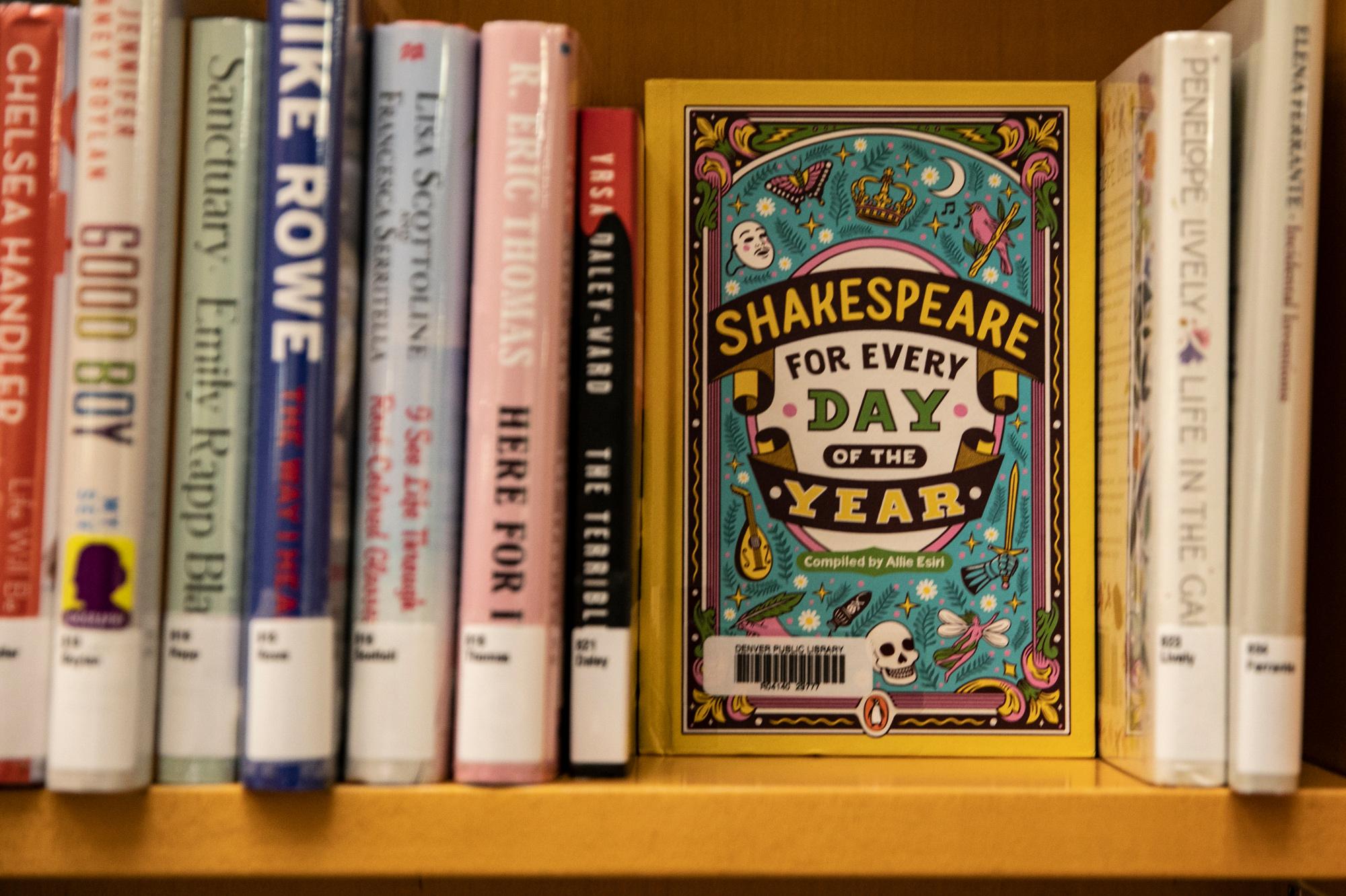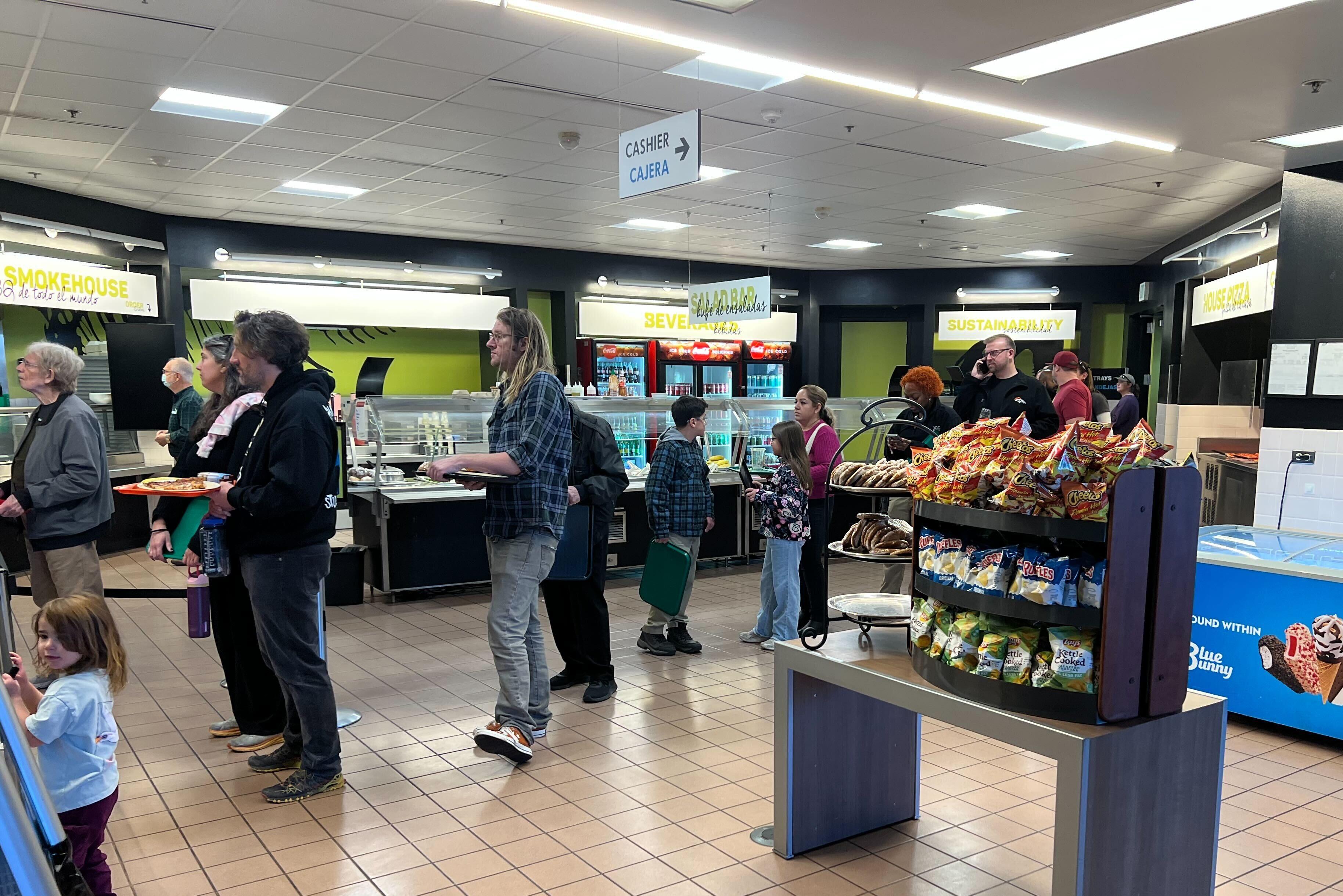Republican Darryl Glenn, an Air Force veteran and El Paso County commissioner, is looking to unseat Sen. Michael Bennet, a Democrat. He talked to me this week, and this is a complete transcript of our conversation.
Why should people vote for you for Senate?
I grew up in Colorado and service has been something that has been very near and dear to my heart. I’m looking at the direction of this country and I’ve got two adult daughters and I want to make sure that they get an opportunity to achieve the American Dream just like so many other people. I’ve spent 21 years in the military serving my country, and I believe I have a vision to be able to help people succeed regardless of their socio-economic status or background or any of that.
What do you think are the main barriers to that right now?
One, when you’re taking a look at what’s happening, I think that we need to stop being so partisan. We need to work closer together and realize that we live in the greatest country on the face of this earth. We do have our philosophical differences, but I think we need to do a better job of sitting down and learning from one another’s different perspectives and laying out an agenda that is soundly based on our constitution that actually works for us. What I am concerned about is the growing divide that I see in the country because people are having to pick a side and we are not spending enough time talking to one another and having real substantive discussions about what are the proper roles of the federal government and what we need to be able to do to move forward.
You had said repeatedly in the primary that the problem with Republicans is that they're reaching across the aisle too much and it was time for conservatives to lead. And of course the Democrats have seized on that to say you’re an extremist and won’t work across the aisle. What you just told me about not being so partisan, is this a position that’s evolved since the primary or what did you mean when you were saying the problem with Republicans is that they were reaching across the aisle?
It’s still consistent. The problem when you start talking about partisan politics -- and you could use the Iran nuclear deal and the Affordable Care Act as perfect examples -- a lot of people view reaching across the aisle as supporting something that you’re philosophically opposed to instead of laying out an agenda that is not so partisan that is actually in the best interest of the country. My focus really is on leading,and when you lead, it doesn’t matter if you’re Republican, Democrat, unaffiliated, because if you’re focused on the agenda that is in the best interests of the public, that’s a rallying cry. That’s something everybody can get behind. If you’re focused on supporting a partisan agenda, that’s what I take issue with. To use the example of Republicans, we’ve been lectured at that if you don’t support the Iran nuclear deal, if you don’t support the Affordable Care Act, you’re not bipartisan. And it works both ways. If you lay out a vision, that’s something that everybody should get behind.
Let’s talk about the Iran deal. Why was that so bad for this country? Why should people be so concerned?
When you’re dealing with the No. 1 world sponsor of terror, in my opinion, we are assisting with escalating the tension in the region. They are threatening the United States, they are threatening our No. 1 Middle East ally, Israel. When you’re looking at the money that has been, the wire transfers that are being sent to Iran, -- and you can debate whether or not those are ransom payments or what --- when you look at the bottom line, I do not believe that’s in the best interests of this country. You’re dealing with a country that is going to use that money and potentially use that against our country and Israel and completely destabilize the region. This is something that Michael Bennet as the deciding vote on that particular issue should be held accountable for. You don’t hear him talking about what’s going on right now when we talk about the wire transfer payments that are being sent there that could potentially be used against our own men and women in the armed services. That’s something that as senator, I’m going to lead on to repeal that and ask for and fight for sanctions to be re-imposed, stricter sanctions, because this is not in the best interest of our country right now.
Do you find that this issue resonates with voters? Do you find that this is something people are concerned about?
Absolutely. People are very aware that there are national security threats that are out there, and they’re very aware that you’re sitting down and negotiating with somebody and then you hear rhetoric about “Death to America” and then threatening your number one ally in the Middle East, people are aware of that. And then when you’re entering into an agreement that you don’t have the ability to verify whether or not they’re complying with that and then as you’re seeing that play out, where Iran is becoming more overtly a threat and we’re seeing payments that are being sent to them that could be used against our own military, people are aware that this is a growing area of concern.
You ran in the primary and still use this phrase of being an “unapologetic Christian conservative.” There’s been some criticism even from within the Republican Party that you’re not doing enough to reach outside your base. What are you doing to make your case to more moderate voters for whom maybe your religious faith isn’t as big a deal or they’re not necessarily looking to send the most conservative person to Washington?
Well, let me put my statement in proper context, and I hope you report this. I say that not to influence anyone whether it’s religion, or I talk about supporting the Second Amendment too. I’m saying that to alert people and remind everyone that the one thing we have as Americans, we have our First Amendment rights to be bold and brave and proudly proclaim who and what we are. There are so many people that right has been suppressed under the current administration and supported also by Michael Bennet. What I would like is for you to report the proper context of that statement. It’s that it’s an empowerment statement for everyone that you live in the greatest country on the face of this earth, and you have a right to be proud of who and what you are. It’s almost like giving people permission to say, “Look, I’m an American, and this is what I stand for.” And when you can do that, that’s when you really understand what you can do and your untapped potential as being an American. When that’s actually explained and properly reported, people absolutely agree with that statement.
How do you think that’s being suppressed?
Because when you’re paying attention to issues that are out there, what I would say is, I would challenge you to go out and talk to Christians and ask them whether they feel like under the current administration, whether or not they believe that their faith has been suppressed. That’s just one example. When I get feedback on things and when I observe things, that’s where you’re seeing and hearing that we have to stop being so politically correct. People are now afraid to speak out about certain issues that must be discussed in this country, and people overwhelmingly are saying that they’re having to, they’re almost having to take a step back and not say something that they normally would say for fear of being viewed a certain way. That’s the reality we’re in. It’s a reality that must be addressed.
Can you just give me one example, something people might hesitate to say?
I can give you an example where there have been individuals who have explained you can’t even use the phrase “radical Islamic terrorism” without it being stretched to say you somehow hate Muslims. That happens.
I may have distracted us with my preamble to the previous question. What are you doing to reach out to more moderate voters?
We are doing a series of townhall meetings. I get out there. My strategy has been to be out and visible, unlike my opponent. I think it’s extremely important to create an opportunity for people to ask your potential senator direct questions. We’re doing that today, at 3 o’clock, where I’m having a tele-townhall so people can actually ask me questions directly. I think it’s important because Michael Bennet is not out there talking to a lot of people. It’s very structured. There are serious issues that people need to be able to discuss and ask their potential senator a question, just so they understand that he or she is listening. That’s what we do and that’s what we’re going to continue to do. It’s to really make sure we make ourselves publicly available for people to ask questions and then answer them.
I noticed in the Facebook post that some of the topics include law enforcement and race relations. You’ve obviously made a point of using the phrase “All Lives Matter” and talking about this in a certain way. Just this week we’ve had two more shootings. Do you see a specific problem with how law enforcement interacts with communities of color?
What I see is a problem that we are not talking as a community because there are legitimate issues on both sides, from the law enforcement standpoint, from a public policy standpoint, from a minority community standpoint, especially the black community, which are being played out right now. What I want to do is encourage dialogue.
I think it’s extremely important to use this as an opportunity to bring your policy makers together along with law enforcement and your first responders and community leaders to really sit down and have a discussion about getting to the root of what is going on as far as understanding each other’s perspectives. And that is something you are going to see me support and continue to push for because there are legitimate issues that have to be debated and discussed, like I said on both sides, and then you need to come up with a game plan on how to correct that.
When we don’t talk about these issues, all it does is kick the can down the road, and that’s not in the best interests of our country or anybody that’s involved. That’s why I’m really going to push for let’s unite around this and talk about it and come up with a plan to do something instead of just talk about it.
What role do you think the federal government should be playing in helping to resolve this?
That’s a great example because we really need to have this discussion. My role and what I’m going to do as a senator is be a leader to help bring these groups together. You need people on all levels, your local level, your state level, and also from the federal level to really get down to these issues and identify what are the problems and what are the solutions because if there is a federal issue that’s involved, whether it’s by way of regulation, that’s something you take back as an action item to do.
A lot of these problems are people that are overly frustrated, feeling like from an economic standpoint, they’re unemployed, they’re underemployed, things in their community are not getting any better, there’s a root to some of this frustration that is out there.
As a senator, I want to lead in bringing everyone together, but then I want to properly identify the local concerns that your mayors and council members can be working on, your state level issues that they can be working on and if there are federal issues that we can help out, identify, either by removing some of the restrictions that the federal government is putting on or properly refining those, that is something that is productive because the whole system has to work from the federal government down to the local level.
That’s what I bring as far as experience, having that city council background. I’ve worked it at a city level, I’ve worked it at a county level, and now from a federal level, I’ll be able to understand how these things work and come up with a plan, and that’s just going to help people.
You talk about the economic concerns of the African-American community. Why do you think so many more African-Americans vote Democratic instead of Republican?
I definitely believe Republicans need to do a better job outreaching and going in and talking to all people, especially in your underserved areas and minorities. We need to do a better job of, if you’re wearing the Republican brand, sitting down and having those discussions and asking those why questions It’s important to one, understand the perspective of somebody that has not supported your party and ask them, “Why is that?” What is it about your party and your policies that are not resonating within the minority community?
And you can’t fix that issue until you talk about that issue. And Republicans need to do a better job of standing up for the issues that I believe will support the minority community, and education is key. This is where Democrats and Michael Bennet are on the wrong side of this issue. Education is the major equalizer and Michael Bennet continues to distort my representations of what the plan is for education. I’m not advocating cutting funding for education. What I want to do is, I believe it’s more properly aligned if we give as much control of those dollars at the state level as possible.
The focus needs to be on children, and you need to be able to have all educational opportunities. Michael Bennet will not even support vouchers. You should have every opportunity that’s out there. That’s something that, specifically when you talk about minority communities and underserved areas, being able to use vouchers, if you’re in a failing school area, is critical, and he won’t support that.
Shifting gears, can you talk about your concerns about the renewable energy tax credits? That’s something that in Colorado at least has had bipartisan support and that supports a lot of jobs here. Why do you think we’d be better off without that?
Your premise, I’m concerned, and I would disagree with that. My focus is on the fact that I believe we should be supporting all forms of energy and we need to get to the point and come up with a plan where we’re not subsidizing one form of energy over another. That’s where the focus needs to be. I don’t see a path forward, and I’m even talking oil and gas. I’m talking all of them. We need to be able to make sure that the market is able to dictate our energy source. We shouldn’t pick winners and losers. Right now, there is no plan to ever become sustainable. That’s my issue. My issue is, that’s great, Colorado should lead when it comes to energy independence. We need to get to the point and develop a pathway so the market can take over and you’re not subsidizing that because the market should not dictate the energy source. We need to be focusing in on the actual customer and what is the cost to that person to be able to pay their electricity bill?
What we’ve seen with the most recent filings from Xcel is that costs are coming down for sun and wind so that people’s bills are coming down with the investment. Can I get a yes/no on whether you want to continue that tax credit program?
My plan for all of them -- you haven’t cited any data -- what you still need to address is becoming sustainable without a subsidy. That’s my plan. That’s what we need to do as a country, get to a point where all forms of energy are viable but you allow the market to do it without a subsidy.
(Note: Xcel Energy in recent years has entered into a wind contract and solar contracts just because it was the cheapest form of energy they could buy at that time. I was wrong to extend that to say bills are coming down.)
So would you transition those out or would you just end them?
You have to come up with a transition plan, but what I’m saying is there is no plan. Nobody is talking about that. They’re just assuming if you’re receiving a subsidy on one form of energy, that it’s going to be there indefinitely. In my opinion, we need to come up with a plan to become energy independent and free of subsidies.
You’ve talked about overregulation as an issue that you think reaches across parties. What are particular regulations you think we should get rid of?
We need to do a better job identifying issues that are affecting businesses. One regulation in particular is the Affordable Care Act and what is happening with insurance premiums. That is a significant barrier to employment. And when you start thinking of banking regulations and looking at Dodd-Frank, what we need to do and it goes back to my plan of why it’s so important to be able to bring people together, especially employers and employees, is really hash out and identify what are those things that are preventing us from growing this economy effectively. EPA regulations are another example, when you look at what is happening in the mining industry. Delta County alone is losing more than 1,200 jobs because of the EPA standards that are out there. We need to sit down and really discuss whether or not we’re doing things to slow down our own economy.
(Note: Delta County has lost a lot of jobs due to mine closures, though not all of them yet. At one point, 1,200 people in Delta County worked in mining; now it's just a few hundred. It's still a lot of jobs.)
Where does the environmental balance come in?
We all recognize that the climate is changing. What we need to do is a better job figuring out and discussing and reaching a level of consensus as far as man’s impact on the environmental controls but balancing that with the economic impact of what we’re doing with our economy and implementing policy. I don’t see a lot of debate and discussion along those lines
It tends to be more polarized because you’re arguing about themes. You’re arguing about climate change. You’re really not talking about what our role is and what we can do and regulate and what we are willing to absorb from an economic standpoint as far as impacts on families being able to pay their bills and our overall economy. That’s where more of the discussion needs to happen and I think that’s healthy.
(Note: Of actively publishing climate scientists, 97 percent believe climate change is likely caused by human activity.)
There have been a lot of polls that show you pretty behind in this race. What do you think the polls aren’t getting? What are they not understanding? Why are do you think you’re going to prevail?
You must not have seen the most recent poll that showed us within seven. I don’t even believe polls, but seven points, even if you take that as the extreme and with Michael Bennet out there tweeting that the polls are shrinking, your premise is completely wrong.
I saw the seven points. The people who did that poll still give a pretty strong advantage to Bennet. How are you going to close that and what do you think the polls are missing?
One, I don’t believe in polls, but two, what it’s showing is people are focusing in on the issues. It’s shrinking rapidly, and I firmly believe we’re going to win this thing by four points.
When people are now focused in after Labor Day and looking at the issues, and they realize that Mr. Bennet was the deciding vote on the Iran nuclear deal, the deciding vote with the Affordable Care Act, was instrumental behind the EPA regulations that are shutting down and slowing down this economy, they are going to hold him accountable. We’re going to continue to deliver that message and show that when they elect me, I’m actually going to get out there and talk to people and be their representative because he is not doing that. He is not doing a good job.
He is doing a good job voting in lockstep with the current administration, but sometimes the administration is supporting policies that are against the will of the people in Colorado. We’ve just highlighted three areas. On top of that, he won’t even support vouchers for educational opportunities for people in underserved areas. This is a glaring weakness in his platform, and that’s why you’re seeing such quick movement in the polls.
(Note: Two other recent polls give Bennet a 10 point and a 13 point advantage, respectively. The latter one, by Colorado Mesa University and Rocky Mountain PBS is the university's first foray into polling and has a margin of error of 6.3 percent, which is relatively high.)
You’re not talking to the Denver Post. You put out a statement about that, and one of the things you said is that they don’t have anything that you want. If you win, how will you be accountable to your constituents if you won’t take questions from the state’s largest newspaper?
To properly frame that, it’s really the role of them being the moderator for this election cycle.
You’re saying that if you were elected you wouldn’t necessarily continue this policy?
Oh, absolutely. The focus on this election cycle cannot be Darryl Glenn versus the Denver Post. Right now, you’re trying to set a discussion and you want to make sure the focus is on the candidates and not everything else that in my opinion is well outside the bounds of politics.
I’m not sure how to interpret that. Are you saying that if you won you would speak to them after the election?
Yes.














